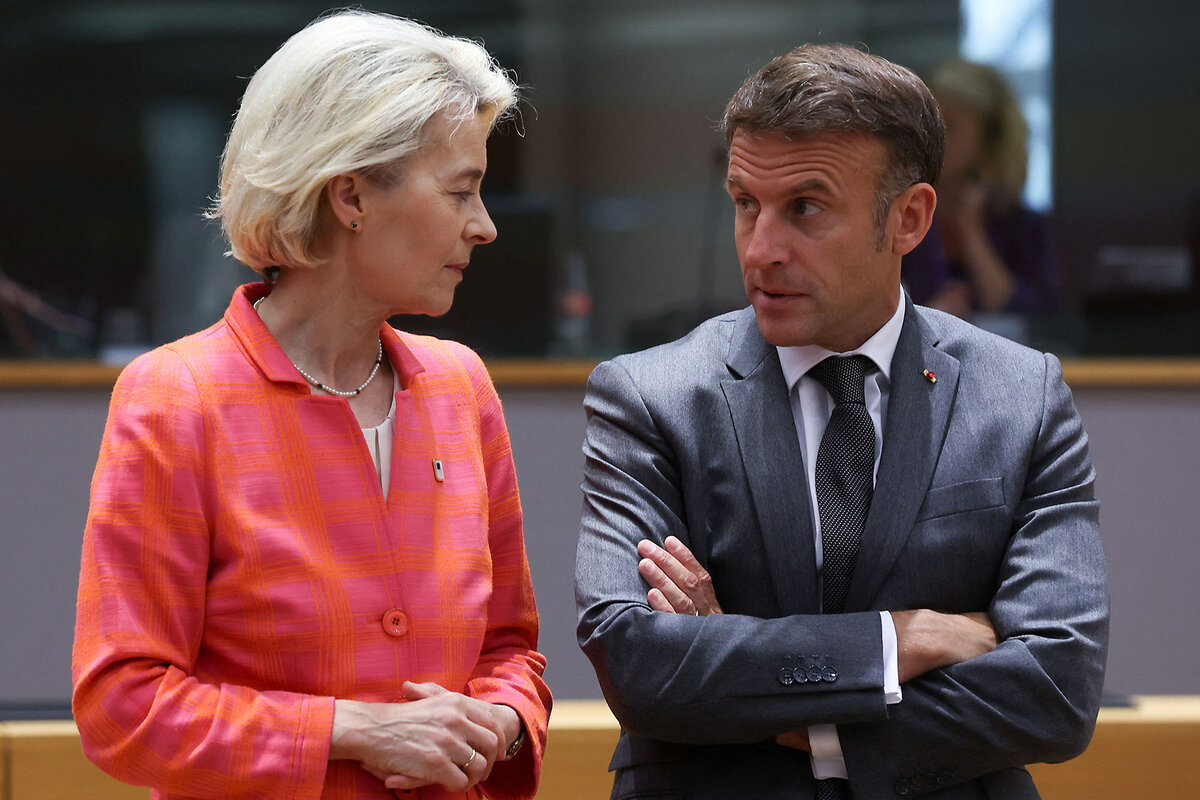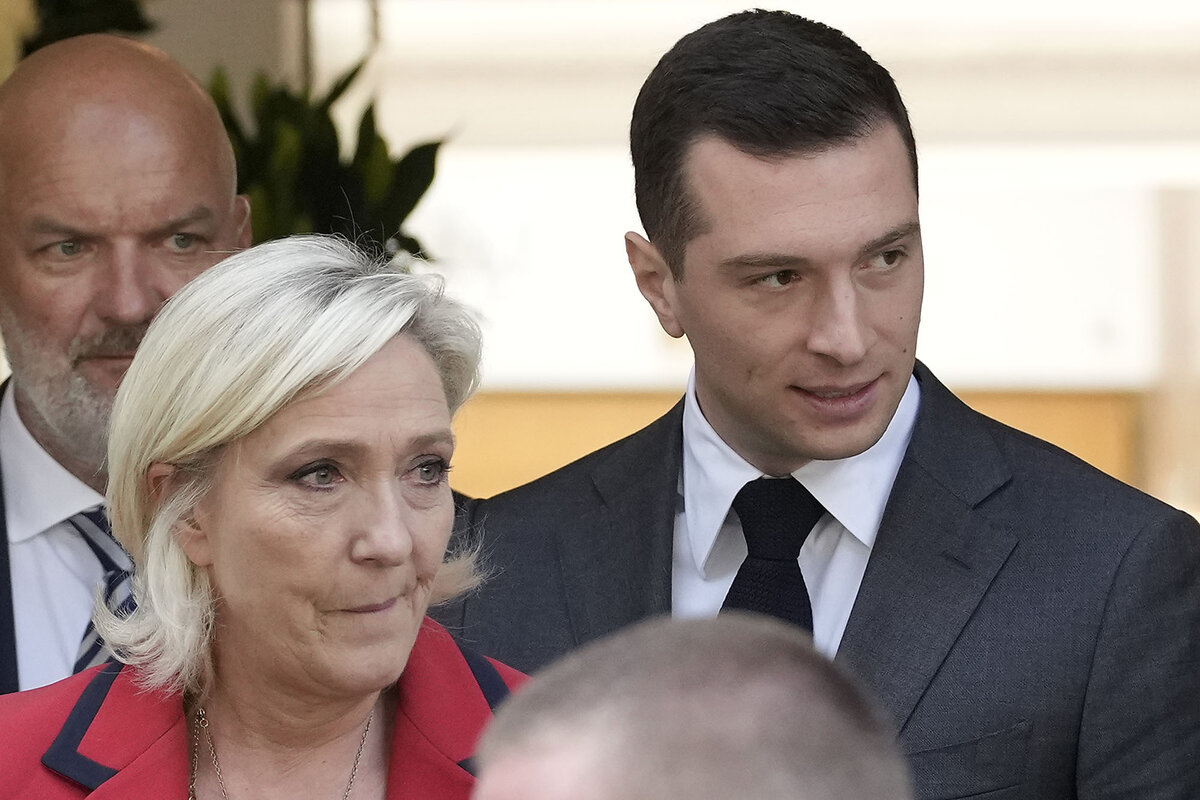British and French elections promise dramatic turnover. Will aid for Ukraine falter?
Loading...
| London
The political experts call them “change elections,” and they often cite two powerful examples: Britain’s 2016 vote to jettison its decadeslong membership in the European Union, and Emmanuel Macron’s out-of-nowhere triumph in France’s presidential election a year later.
Now, however, we are days away from a different kind of change election in both countries.
“Comeuppance election” might be a better term, because voters are poised to deliver a thundering rebuke to Britain’s Conservative Party, the architects of Brexit, and to the centrist party that Mr. Macron created and rode to victory nearly a decade ago.
Why We Wrote This
Imminent parliamentary elections are expected to radically change the political landscapes in Britain and France. Under new management, will London and Paris maintain their lead roles in backing military aid for Ukraine?
While the domestic policy implications will become clear only after new British and French governments take shape, there’s a critical international question on which they will have to weigh in sooner: Russia’s invasion and occupation of Ukraine.
Britain and France are key European members of the transatlantic NATO alliance, and neither is suddenly going to reverse course.
The man virtually certain to become Prime Minister in Britain after its July 4 election, Labour Party leader Keir Starmer, has been unequivocal in backing Kyiv.
Under the French system, Mr. Macron will remain president until 2027 – and thus retain some influence over foreign policy – even if his Renaissance party gets thumped, as predicted, in the two-round election on June 30 and July 7.
Mr. Macron and a succession of Conservative leaders in London, notably former Prime Minister Boris Johnson, have taken increasingly front-line roles in opposing Russia’s invasion.
That has proven especially important in light of waning Republican Party enthusiasm for U.S. President Joe Biden’s policy of support for Ukraine.
A sign of whether Britain and France will still feel ready – or, in Mr. Macron’s case, politically able – to continue to play that pivotal role could come as soon as next month.
On July 18, Britain will host a meeting of European leaders, with Ukraine topping the agenda.
Yet the conference’s origins lie in the European political landscape before the British and French elections.
It’s a meeting of the European Political Community. The EPC was set up at Mr. Macron’s urging in the wake of Russia’s 2022 invasion, to bring together leaders from both inside and outside the European Union, crucially including post-Brexit Britain.
The conference was announced by Conservative Prime Minister Rishi Sunak back in March. The venue – Winston Churchill’s ancestral home of Blenheim Palace – was a nod to Boris Johnson’s vision of Britain, unshackled from the EU, playing a Churchillian role in galvanizing Europe’s support for the Ukrainians.
There’s every reason for Mr. Starmer and President Macron to embrace the opportunity for a high-profile reassertion of leadership on support for Ukraine, and they may well do so. But their longer-term calculus will be affected by the results of the British and French snap elections.
In Britain, Brexit is just one reason for the Conservatives’ sorry plight. Polls suggest most voters now believe it was a mistake, but a raft of other concerns – the economy, public services, immigration – and a series of corruption scandals have contributed to a wider sense that, after 14 years of Conservative rule, it’s time for a change.
Mr. Starmer, despite his wide lead in opinion polls, has steered clear of radical promises. He has barely mentioned Brexit, beyond saying that he will try to repair ties with the EU, and has instead prioritized bringing the country together, providing good, honest government, and reviving the economy.
In France, President Macron was hoping that the far-right National Rally (NR) victory in recent EU elections would shock voters back to the center when asked to choose a new parliament. Instead, both the NR, led by Marine Le Pen, and a far-left coalition seem set to make major gains.
The two-round system makes the final outcome difficult to predict. But it seems certain that Mr. Macron’s supporters will no longer be the largest parliamentary group.
Mr. Starmer’s political calculus could encourage him to maintain the Conservatives’ emphasis on Ukraine. Pre-election, support for Kyiv was one of several issues on which he’d deliberately steered his Labour Party to the political center, marginalizing its left wing.
Mr. Macron may face a trickier challenge. France’s constitution is ambiguous over the extent of his sway over foreign policy. And he will be governing alongside a changed National Assembly.
Both Ms. Le Pen and the main far-left leaders have condemned Russia’s invasion of Ukraine. But they have shown themselves to be decidedly tepid toward NATO, skeptical about risking too deep a French involvement in Ukraine, and drawn to the notion of a negotiated compromise.
The question facing Britain’s new prime minister and France’s electorally chastened president will not be whether to drop their support for Ukraine altogether.
But the nature of that support is at stake: how high a priority will it be? For how long will the two men use their voices in Europe and beyond to take a lead role in drumming up sustained financial and military support for Kyiv?
And those questions may become critically important to Ukraine’s future because of another election.
The vote in the U.S. this November could bring Donald Trump, openly sympathetic to Russia’s claims on Ukraine, back to the White House. That would test European mettle as never before.








